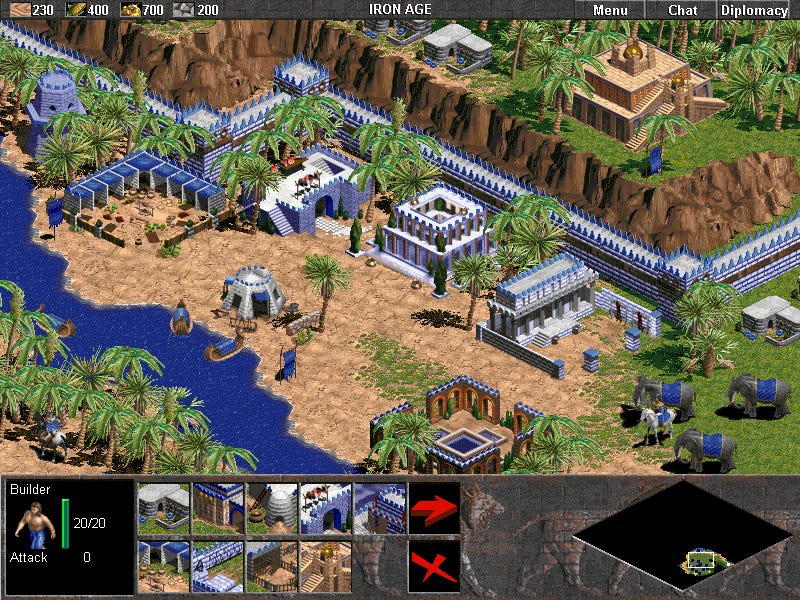What digital marketing and RTS games have in common
Perhaps my nerdiest post ever, but I promise there's takeaways even if you aren't a Starcraft geek

Today’s post is going to be pretty geeky. Consider yourself warned (but I promise to try and relate back to our work). Anyway, growing up I was really into RTS (real-time strategy) games. Titles like Warcraft 1 and 2, Age of Empires, Starcraft, I couldn’t get enough of them.
In case you’re unfamiliar, here’s a brief definition of RTS games:
Real-time strategy (RTS) is a sub-genre of strategy video game which does not progress incrementally in turns.
In an RTS, as in other wargames, the participants position and maneuver units and structures under their control to secure areas of the map and/or destroy their opponents’ assets. In a typical RTS, it is possible to create additional units and structures during the course of a game. This is generally limited by a requirement to expend accumulated resources. These resources are in turn garnered by controlling special points on the map and/or possessing certain types of units and structures devoted to this purpose. More specifically, the typical game of the RTS genre features resource gathering, base building, in-game technological development and indirect control of units.
Perhaps I enjoyed them so much as I was always fairly strategy-minded having also been a chess player since a young age. This genre of game I always found more cerebral and the payoffs more fulfilling than FPS (first person shooter) games.
Recently I was chatting with a friend and somehow the subject turned to RTS. I hadn’t thought of them in years, but made an almost instant connection back to my time as digital empire strategist as a teen and realized how they have quite a bit in common with digital marketing.
Some of the commonalities between the two I instantly thought about:
You need equity before you get to outcomes
In RTS you need resources: whether gold, food, wood or minerals before you’re able to upgrade your armies or stronghold. You need to search for these resources and setup a process to harvest them. Then, you need to use your resources for outcomes: to summon additional forces or increase your defenses.
Not really so different in digital marketing. Before you’re able to get conversions from your activities or have them resonate, you need to to build equity: in the form of links, content, traffic, subscribers, etc. For example, you don’t immediately gain outcomes from social media, rather you need to build your community before you need them. Only then can you activate them for results.
Newbies want shiny objects, experienced pros want to win
In RTS new players always want the biggest and most expensive weapons or fortresses. What they don’t realize is in their quest to pursue these things, they skip over tactics that would actually let them easily win. Frequently the most common items are the most valuable if used properly, the cost of investing in the larger items is so great they actually don’t make sense to invest in until you are already rocking the basics.
In digital marketing, newbies want to skip to execute complex ideas that might generate buzz. And buzz absolutely makes sense as part of a mix of tactics. But without consistency and “showing up” (underrated!) it doesn’t matter because you’re not building up any momentum behind your brand or community. It’s the daily stuff in between the big items that actually matters most.
Being committed and passionate count
In RTS, those who practiced their craft dominated those who weren’t as efficient with the systems. They learned the keyboard shortcuts, they spent time thinking about strategies and they practiced like it was nobody’s business. Irrationally so, some players spent more than an obsessive amount of time honing their skills and formulating strategies that were difficult to predict.
In digital marketing, it’s very much the same. Those who are committed and passionate take the time to practice personally and professionally. For it, they understand better how to lead their companies or clients to success and how to deftly activate their audiences. In both cases being committed and willing to put in the effort to learn how to best use tools and develop programs count.
This is just a very short list, I could go on. But what do you think – any RTS players/marketers see other similarities?





As a fellow RTS nerd, I'll add: a well-placed helicopter of engineers beats a tank rush any day. #Command&Conquer4ever
And by that I mean: a smart, well-executed small-scale strategy that yields disproportionally great results is worth spending time finding, especially when your competitors are just constantly throwing money at dumb tactics that yield diminishing returns.
This means that for small-scale folk (eg. a lone writer building their own brand reputation - ahem), it is better to spend time and energy finding something that fits your current scale of operations instead of trying to copy the tactics of the big companies that are doing well just because they're big and wealthy and have plenty of resources to burn in zero-brained ways.